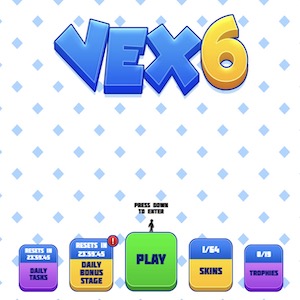Vex Games
The Vex series, a popular stick-figure platforming game franchise, has enthralled gamers worldwide with its unique blend of thrilling gameplay, intricate level design, and innovative features. The series, first launched in 2013, has since grown to include multiple titles, each iteration introducing new challenges, engaging mechanics, and additional content that keeps players coming back for more.
The appeal of the Vex series lies primarily in its simplicity and depth. Each game in the series centers around guiding a nimble stick figure through a perilous platforming landscape filled with deadly traps and obstacles. The controls are intuitive, usually involving the arrow keys for movement and jumping, and the spacebar for other actions like sliding or climbing. This simplicity allows players to easily pick up the game, while the depth of the platforming challenges keeps them engaged over the long term.
The core mechanics of the Vex games focus on precision, timing, and swift reflexes. The series is notorious for its challenging levels, which often require split-second decisions and impeccable timing. From swinging pendulums to spinning blades, the obstacles in each game are designed to test the player’s skills to their limits. Success in the Vex games is a satisfying testament to the player’s platforming prowess.
Each game in the Vex series introduces new elements and enhancements, building upon the foundation laid by its predecessors. For instance, Vex 2 added a stage builder feature, allowing players to create their own levels and share them with others. This feature adds a layer of creativity and replayability to the games, fostering a sense of community among the player base. In Vex 3, the series introduced additional modes, further expanding the gameplay options available to the players.
The aesthetics of the Vex series adhere to a minimalist design philosophy. The graphics are crisp and clean, highlighting the stick figure protagonist against the stark, obstacle-laden landscapes. The simple, cartoony art style ensures that the focus remains squarely on the gameplay. The sound design, although simple, is effective, providing players with immediate audio feedback and enhancing the overall gaming experience.
The series’ narrative, although minimal, adds another layer of engagement to the games. The player controls the protagonist, often faced with rescuing friends or thwarting villains, providing a simple yet compelling motivation that drives the gameplay forward.
In the later games of the series, from Vex 4 to Vex 7, the franchise continues to evolve and innovate. These titles introduce more complex level designs, more varied obstacles, and even boss battles, increasing the challenge and excitement. The stage builder feature is further refined, and the achievement system is expanded, providing additional goals for players to strive for.
The enduring popularity of the Vex series can be attributed to its winning combination of accessible yet challenging gameplay, creative level design, and continual innovation. Each game in the series is a testament to the effectiveness of this formula, offering an engaging, fun-filled platforming experience that appeals to both casual gamers and hardcore platforming enthusiasts alike.
In conclusion, the Vex series stands as a shining example of platforming games done right. With its emphasis on skill, precision, and creativity, the series offers a gaming experience that is simple to pick up yet hard to master. Its success serves as a testament to the timeless appeal of well-crafted platforming games, proving that sometimes, simplicity truly is the ultimate sophistication.






